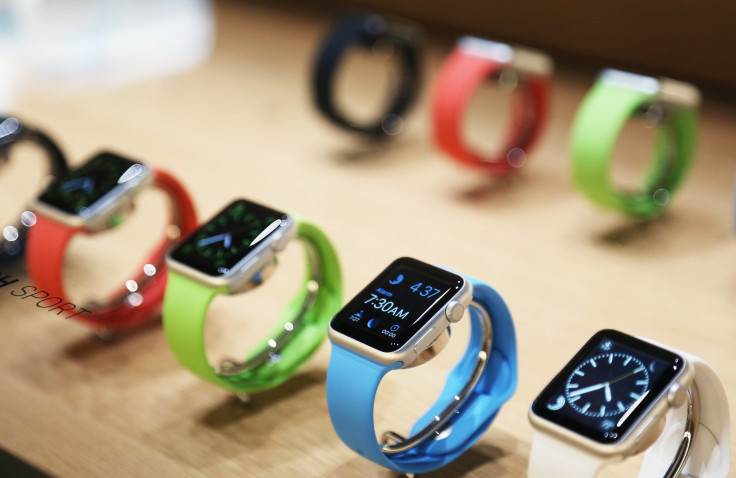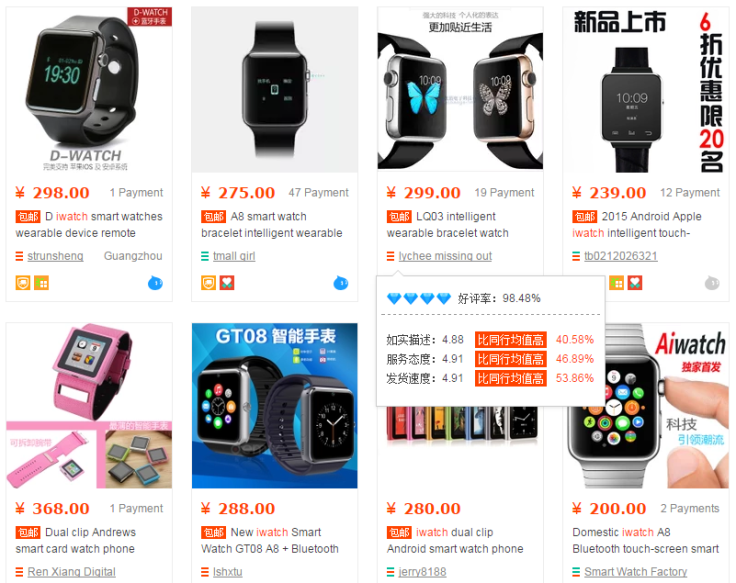Fake Apple Watches Surface In China, And That's A Great Thing For Apple Inc.

Call it the attack of the Apple Watch clones. Less than 24 hours after Apple revealed details about its new smartwatch, Chinese e-commerce sites are chock-full of knockoffs priced as low as $30.
Several third-party clones surfaced on China’s Taobao, an Alibaba e-commerce site similar to Amazon and eBay. Instead of spending between $349 and $17,000 for the Apple Watch, shoppers can grab Android-powered look-alikes for well under $100.
Browse around Taobao, and you’ll find options like D-Watch, GT08, LQ03 Intelligent Wearable Bracelet and the craftily named Aiwatch, among many that don’t carry a specific brand name. On the surface, they appear almost identical to the Apple Watch, including the buttons and digital crown used to zoom and navigate through apps. But on closer inspection, the differences start to show.

Some have the option of coming with no touch screen, while others pack on the features: Bluetooth, cellular connectivity, headphone jacks and Internet chat through services such as QQ. And unlike the Apple Watch, many of the knockoffs are compatible with both iOS and Android devices.
It's just the latest in Apple-product counterfeiting. As the iPod grew in popularity, knockoffs began to pop up on the market, many branded as “MP4 Players” in packaging nearly identical to the real thing. In the lead-up to the announcement of the iPhone 6 in September, countless counterfeit models based on leaked iPhone parts surfaced. But instead of running iOS, many have a version of Android installed and a facade that looks like the real thing.
Reflecting Local Demand
But just like the iPhone 6, the proliferation of Apple Watch fakes is a good omen for Apple. Rather than hurting sales, counterfeiting is one of the most reliable indicators of Chinese demand for a product. Apple's iPhone 6 was a prime example of that: Sales of fake devices gave way to blockbuster sales of real ones.
In fact, the market was able to predict the performance success of other wearables in China’s market. When Google Glass and Samsung’s Galaxy Gear were launched, an abundance of fake versions of the heavily hyped products were expected to follow.
“I’ve never seen a knockoff [Galaxy] Gear in this whole town,” one shopkeeper in Huaqiangbei told CNN. “They don’t sell well.”
Even though China’s government has been taking steps to stem the proliferation of fake goods on popular e-commerce websites, China has a deeply ingrained counterfeit culture. In a country where you can find copycat architecture, designer goods, and even fake college degrees, China’s electronics counterfeiting is arguably the most advanced.
Despite the counterfeiting, Apple is pushing hard into China. In the past six weeks, the company opened six retail stores in China, bringing its total in the country to 21. It plans to nearly double that by mid-2016, exposing the brand to more of the country’s growing middle class.
Straight Out Of Shenzhen
Many of the counterfeit Apple Watches being sold online, as well as at a popular electronics market called Huanqiangbei, are manufactured in Shenzhen. When Shenzhen’s electronics counterfeiters recognize a demand in the market for knockoff versions, they can crank out product quickly -- in this case, even before the genuine article is officially released.
“These guys are specialists,” Laurent LePen, the founder and CEO of Shenzhen-based smartwatch company Omate, said of the notorious reputation of local counterfeiters, according to CNN. “The speed at which they can bring copies on the market is amazing.”
The popularity of the Apple Watch knockoffs is an encouraging sign for sales of the real thing in the China market, as it often reflects local demand. While China is not the company’s largest market yet, it provided huge revenue growth for the company in its first 2015 fiscal quarter at $16.1 billion, a 70 percent increase over the same period last year, according to company filings.
© Copyright IBTimes 2024. All rights reserved.





















